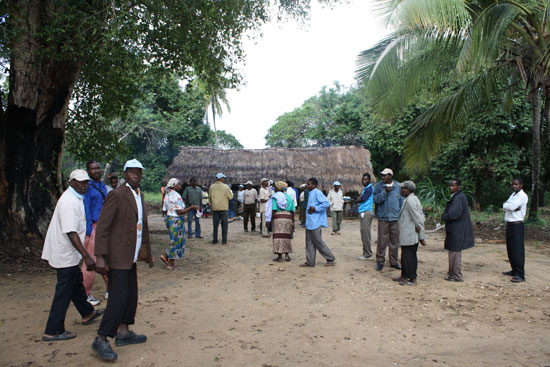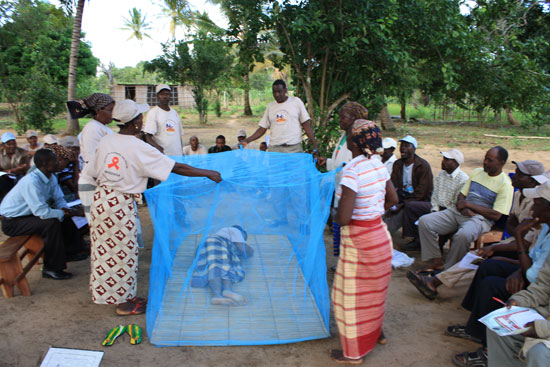Tevele - Dr. Ryan Meili
June 2010
The road to Tevele is red sand and sloppy on this rainy morning. The rains have come early this year, and though abundant are not entirely welcome as they interfere with beans ready for harvest. We bounce in and out of ruts as we head thirty-some kilometres to this out-of-the-way rural community, located between the ocean and the national highway.
We are travelling with Dr Gerri Dickson, director of the Centre for Continuing Education in Health, and two teachers from that institution: Cipriano and Flavia, both of whom studied in Saskatoon as part of their teacher training.
The Centre for Continuing Education in Health has a long relationship with Tevele. The núcleo, a group of leaders selected by the various surrounding communities, meets regularly with staff and students from the Centre to work to address the health needs of the people of Tevele. Over the years they have selected malaria and HIV/AIDS as areas of focus, and done various public education campaigns and research projects to try to improve prevention and access to treatment.
Núcleo members, many of them quite elderly, walk for miles to attend the meetings. While waiting for those late to arrive we huddle around a fire built in a hollowed out section of a large tree to take off the morning chill. After morning tea, a group of keen participants starts a raucous gathering song: a kama wasiya (time is running out). It's a classic, well known by the members, and people clap and dance, animating the meeting grounds.
Like the centre, I also have a long relationship with Tevele, having come here multiple times on each of my previous visits. The members of the núcleo are now old friends and each visit feels like a family reunion. In 2007 I spent a week in the community holding clinics and trying to learn the local language. When the time comes to introduce ourselves I tell them I'm sorry to have been away so long and blame it on getting married. They laugh and welcome Mahli as a daughter-in-law, teasing her because her name means 'money' in Xitswa.

The visitors and núcleo members gather under a large mango tree to start the day's session. The sun has come out and warmed us to the point of leaving our jackets behind in the mini-bus. Part of the opening of every meeting is the singing of the national anthem: Moçambique, Nossa Terra Gloriosa, an event that is taken very seriously. Everyone stands at attention, looks straight ahead and sings in a sombre voice. Passersby on the road to town stop and stand until the song is over. Halfway through the first chorus the rain starts anew. This is no drizzle; it's a tropical, soak-to-the-skin-in-seconds downpour. Given the timing no one can run and seek shelter. We grin (and giggle) and bear it, watering pouring down our faces as we finish the final lines of the anthem, then head into the newly built community development centre to start our meeting.
We then turn to the serious business of preparing for an upcoming project, a combination of research and health promotion. Two months ago the núcleo helped to distribute mosquito nets provided by the provincial government to families in the region. Now they are planning a follow-up survey of those families to see if they are using the nets properly. They will also take the opportunity to talk to families about malaria, basic hygiene and HIV/AIDS.

We spend the day preparing the survey. There is lively debate on the questions, about what we really need to learn and how to approach difficult subjects in culturally sensitive ways. This process is particularly exciting because it is the community members themselves, all volunteers living in the same circumstances as the families to be surveyed, that direct the research. They understand what to ask, how to ask it, and perhaps most importantly, why it matters.
After a drama rehearsal of the survey, complete with ribald repsonses from the mock host family, the núcleo members divide into teams. These consist of an even number of men and women, and each group has someone who knows how to read and write and someone who speaks both Xitswa and Portuguese. Next month these groups will join with Mozambican health trainer students from the Centre and medical students from the University of Saskatchewan to go from home to home completing the survey. The Centre and the núcleo will then use the data collected from these visits to guide their future health promotion work.
This kind of development, with research, planning, action and reflection led by community members, is laborious and complicated. It requires much revision, reconsideration and patience on the part of the staff from the núcleo members and the Centre staff. The end results, we hope, are a community better prepared to tackle its own problems and health interventions that will work because the community believes in them. Seeing the núcleo members come out to work month after month is strong evidence of the dedication of the local people to improving their health. After next month's follow-up visit we'll know a little bit more about how this is helping health messages reach families, allowing them to better protect themselves from illness.

